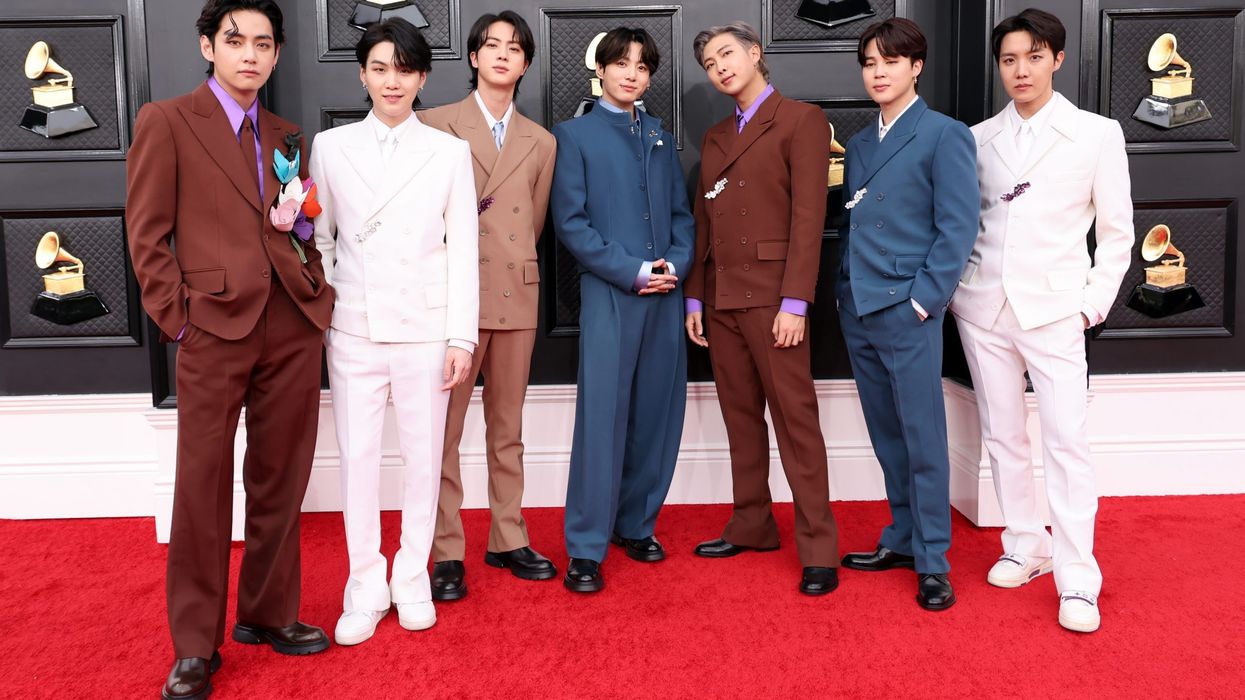Skyscrapers, bridges, and other landmarks in South Korea's capital lit up in purple on Monday as the country begins celebrating the 10th anniversary of K-pop band BTS, whose global popularity is a source of national pride.
The lights will provide the backdrop for various social media-driven events marking the 2013 debut of the seven-member group, which is now taking a hiatus as its singers begin to serve their mandatory military duties.
From Monday evening, numerous Seoul structures, including City Hall, the 123-story Lotte World Tower, several Han River bridges, and the futuristic DDP – a Zaha Hadid-designed aluminum and concrete dome that's often used for visual art – will be bathed in purple, a colour associated with BTS, according to city officials and the group's management company, Hybe.
Messages congratulating BTS were displayed on digital screens in buildings across Seoul, while postal authorities issued stamps marking the group's anniversary, which will be available at post offices starting Tuesday.
Seoul officials hope that the celebrations, which will continue for around two weeks, will boost tourism. The city has designated more than a dozen sites associated with BTS, including places where the group held major performances or shot some of their famous videos. Fireworks are planned at a park near the Han River on Saturday night, hours after one of the BTS singers, RM, holds a live talk with fans that will be broadcast online.
Quickly garnering huge followings in Asia following their debut, BTS' popularity expanded across the globe with their 2020 megahit “Dynamite,” the band's first all-English song that made it the first K-pop act to top Billboard's Hot 100. BTS has since performed in sold-out arenas around the world and was invited to speak at United Nations meetings, supported by a legion of global followers who call themselves the “Army.”
BTS' activities as a full group are currently on hold as the artists begin to serve in the military. Two BTS singers – Jin and J-Hope – have already started their compulsory 18-month service and other members are to follow in the coming months, which likely means the group will reconvene around 2025. In South Korea, all able-bodied men are required to serve in uniform for 18-21 months under a system meant to deter aggression from rival North Korea.
As South Korea celebrates 10 years of BTS, here are some exciting things to know about the seven members of the group.
Jin
Born on Dec. 4, 1992, in Gwacheon, South Korea, Jin is the oldest member of BTS. His real name is Kim Seok Jin. The singer and songwriter was originally an aspiring actor but destiny had other plans in store for him. He joined the group in 2013 as one of the four main vocalists. He is also the first member to begin mandatory military service in South Korea.
Suga
Before joining BTS, Suga worked with many international artists. His real name is Min Yoongi. Apart from being a member of BTS, Suga performs as a solo rapper under the alias Agust D. He is also a commercial producer under the name "By Suga." Suga was born on March 9, 1993, in Daegu, South Korea.
J-Hope
Jung Ho-Seok, better known by his stage name J-Hope, is the richest BTS member. Born on February 18, 1994, in Gwangju, South Korea. J-Hope was recruited by Big Hit Entertainment in 2010 and began training as a rapper. Now, he is one of three rappers in the group, as well as a dancer, songwriter, and producer. He was also the first BTS member to start a solo career.
RM
RM, whose full name is Kim Namjoon, is the leader and main rapper of the popular band. Born on September 12, 1994, RM grew up in Ilsan, South Korea, and began rapping at a young age. After performing under various names, he eventually caught the eye of Big Hit Entertainment, who formed BTS and recruited him to be the first official member of the group in 2010. He is fluent in both English and Korean.
Jimin
Park Ji-min, popular as Jimin of BTS, is the group’s lead vocalist and dancer. Born on Oct. 13, 1995, in Busan, South Korea, he was the last to join BTS, becoming a member of the group in 2013. Like J-Hope, Jimin is known for his dance moves. He studied contemporary dance while he was in school.
V
A singer with a lower vocal range, Kim Tae Hyung, popular as V, is one of the younger BTS members, having been born on December 30, 1995, in Daegu, South Korea. He joined BTS after auditioning for Big Hit Entertainment in 2013.
Jungkook
Jungkook (whose full name is Jeon Jung-kook) is the youngest member of BTS. ARMY affectionately calls him "Kookie" or "Golden Maknae," which translates to "golden youngest." He was born on September 1, 1997, in Busan, South Korea.




